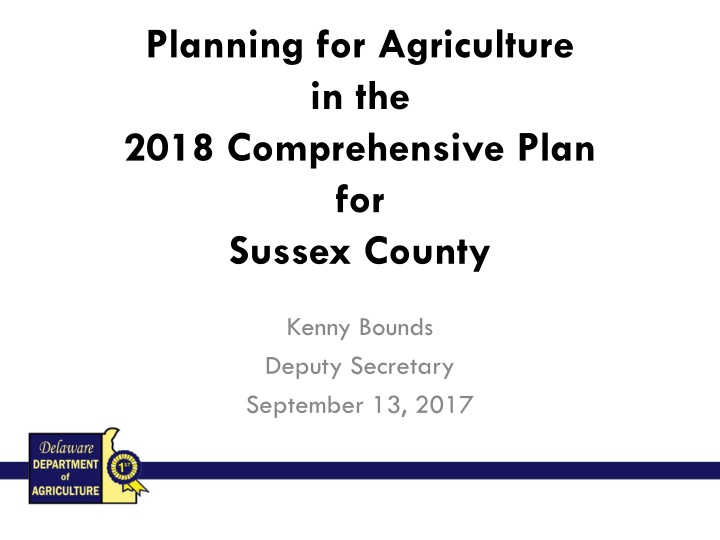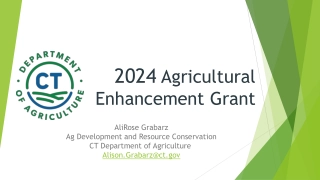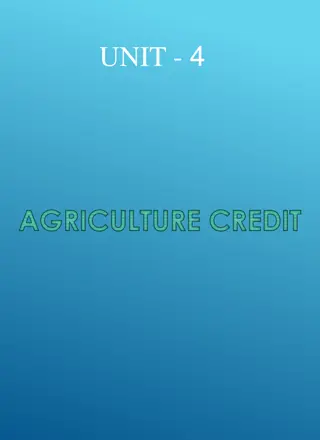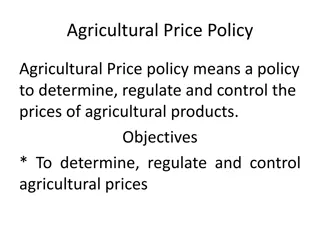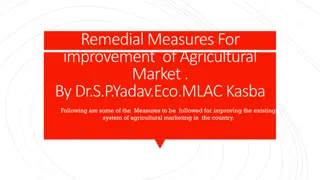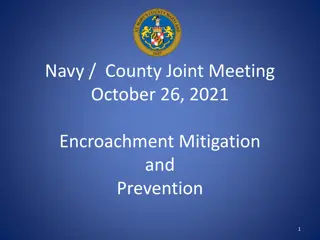Agricultural Planning in Sussex County Comprehensive Plan 2018
Explore the goals and objectives outlined in the 2018 Comprehensive Plan for Sussex County focused on preserving, expanding, and promoting agriculture and forestry industries. The plan aims to support local agriculture, encourage investment, maintain agricultural land, promote conservation practices, and enhance the county's agricultural and forestry sectors for a sustainable future.
Download Presentation

Please find below an Image/Link to download the presentation.
The content on the website is provided AS IS for your information and personal use only. It may not be sold, licensed, or shared on other websites without obtaining consent from the author.If you encounter any issues during the download, it is possible that the publisher has removed the file from their server.
You are allowed to download the files provided on this website for personal or commercial use, subject to the condition that they are used lawfully. All files are the property of their respective owners.
The content on the website is provided AS IS for your information and personal use only. It may not be sold, licensed, or shared on other websites without obtaining consent from the author.
E N D
Presentation Transcript
Planning for Agriculture in the 2018 Comprehensive Plan for Sussex County Kenny Bounds Deputy Secretary September 13, 2017
Presentation 1. Review agriculture goals and objectives in 2018 Comprehensive Plan for Sussex County 2. Look at the benefits of a vibrant agricultural economy 3. Look at the components of Sussex County agriculture 4. Look at what can be done to assure viable agriculture in the future
Comprehensive Plan Agriculture Goals & Objectives Preserve and encourage the expansion of the agriculture and silviculture industries in the County Encourage the adoption of policies that promote agriculture as an important economic industry Promote and retain agriculture in areas with valuable agricultural land or agricultural operations Develop and implement long term strategies to rebuild the forestry industry in Sussex County
Comprehensive Plan Agriculture Goals & Objectives Preserve and encourage the expansion of the agriculture and silviculture industries in the County Create opportunities for new investment in agricultural operations and agricultural support industries Promote locally-sourced agriculture and forestry products
Comprehensive Plan Agriculture Goals & Objectives Maintain the agricultural land base of the County Maintain the amount of land used for agricultural or silvicultural pursuits Reduce the challenges placed on farmers by new development Increase the acreage of permanently preserved farm and forestland in the County
Comprehensive Plan Agriculture Goals & Objectives Work with farmers to incorporate conservation practices Recognize and promote the conservation benefits of having land in agriculture and forestry Explore new funding mechanisms for conservation in the County Continue to support State and County Conservation District efforts to manage stormwater runoff
Comprehensive Plan Agriculture Goals & Objectives Develop a better understanding of Sussex County s competitive advantages and how it fits into the regional and national marketplace
Benefits of Agriculture Proximity to Market - FoodShed for the Eastern United States Exporter of products worldwide Port of Wilmington Poultry, cattle, timber, produce Lots of discussion with African countries Strong economic multiplier 5x to 7x 30,000 jobs in Delaware
Benefits of Agriculture Preferred land use 40% of Delaware land is in agriculture 25% of Delaware farmland is permanently preserved; 16% in Sussex County Land in agriculture promotes enhanced conservation practices, open space and wildlife habitat while providing food security for the local community/county/state/country/world
Benefits of Agriculture 99% of DE farms are family farms; most are multi-generational DE has one of the strongest nutrient management programs in the country and is a leader in environmental stewardship
Specialty Trends Buy local farmers markets, beach towns and restaurants - fruits, vegetables, meats Delawareans want healthy food and a connection to their farmers Visitors eat healthy at home and look for locally grown produce while on vacation
Specialty Trends Agritourism - allows diversification, education Ice cream, bed & breakfast, corn maze, class trips Niche farms & small fruit and vegetable farms Vertical Farming, Hydroponics/Aquaponics CSAs Urban Agriculture
But...Poultry is still King An amazing industry - #1 broiler county in the US Economic engine for Sussex 70% of gross farm income plus poultry supports corn, soybeans Makes grain production economically viable All corn and most of our soybeans go to feed chickens Grain farming on Delmarva would not be feasible without the positive impact of chicken
ButPoultry is still King University of DE Lasher Lab & UD Research and Education Center World class research facility and laboratory protecting the industry from infectious poultry diseases, making new discoveries in animal welfare and best growing practices and keeping the industry competitive
ButPoultry is still King Poultry housing is aging and has been going through a replacement cycle, incorporating new technologies Annual production 244.3 million birds 11thnationally Annual production 1.759 billion pounds 8thnationally Good neighbor relations, best management practices, larger setbacks, vegetative environmental buffers, enhanced manure and carcass handling, housing location sensitivity are all receiving utmost consideration
ButPoultry is still King $414 million in federal and DE state taxes paid $4.649 Billion Delaware Total Economic Impact (2014)
Small and niche farms are increasing in numbers but Our larger farms have a huge impact! Larger fruit and vegetable growers and processors provide high quality, fresh, local produce on a large scale, supplying grocery stores in the northeast. Delaware is #1in number of acres of lima beans harvested. Larger grain farmer are family farms typically made up of many generations. Their production is needed to feed chickens.
What Can We Do? Education of the public Starts with realtors - educate people moving here Sights, sounds, smells, dust, equipment on the road Aerial application, spring field application of manure Animal manure a valuable resource when used appropriately Land application soil health, water and nutrient retention Transportation areas low in P and mushroom industry Alternative Uses composting, anaerobic digestion
What Can We Do? Fully fund of agricultural land preservation Strong right-to-farm laws Protect water rights for farms vitally important to economic viability - assures yield, nutrient uptake Ease the burden of regulation on agriculture while maintaining health, safety and environmental standards
What Can We Do? Assure a strong labor force Promote robust regional markets & exports Support all farms & agribusinesses large & small Cultivate the next generation of farmers Beginning farmer programs, incentives DE Young Farmer Program funding Promote new technologies and agricultural research
What Can We Do? Agriculture in our schools Every middle school should have an agriscience program Those that choose to go into ag in high school have a strong foundation. Those that don t get an appreciate of where their food comes from. Ensure the collegiate curriculum at UD, DSU, and DelTech is meeting the needs of the agriculture workforce
What Can We Do? An early, draft version of the Economic Development section of the 2018 Comprehensive Plan had this quote: Larger and more productive farms has led to NIMBYism and increased conflicts between residents and farmers. The County needs to balance the concerns of residents with needs of one of its most important industries.
Do We Have the Resolve to Assure Agriculture is Viable in the Future? You bet we do! But, it will become more and more difficult as more and more people move here and interface with farming practices. We need to step up our game protecting our agricultural heritage and providing for it s promising future.
Thank You! Kenneth M. Bounds Deputy Secretary Delaware Department of Agriculture Kenneth.bounds@state.de.us 302/698-7554 cell
